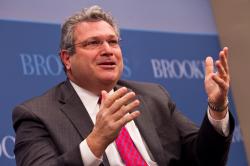

4:30 pm EST - 6:00 pm EST
Past Event
4:30 pm - 6:00 pm EST
1775 Massachusetts Avenue, N.W.
Washington, DC
20036
The United Nations debate over Iraq revealed significant differences between the United States and its major European allies, particularly France and Germany. Their disagreements focused primarily on how best to disarm Iraq—diplomatically or militarily—and when force is justified. The Iraq debate, however, revealed even deeper divisions about the importance of power, the use of military force, the rule of law, and multilateral institutions.
When the conflict in Iraq is over, how can the United States and Europe work together to overcome their differences? A panel of experts convened by the Brookings Institution will address a number of questions on how the rift can be repaired:
Panelists will take questions from the audience following their presentations.



Landry Signé
July 8, 2025

Aslı Aydıntaşbaş
July 3, 2025

Pavel K. Baev, Robert Einhorn, Sharan Grewal, Samantha Gross, Ryan Hass, Patricia M. Kim, Elizabeth N. Saunders, Yun Sun, Caitlin Talmadge, Shibley Telhami, Andrew Yeo
July 1, 2025